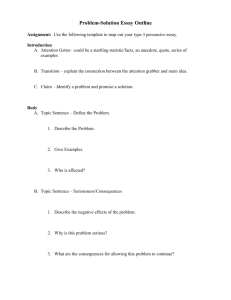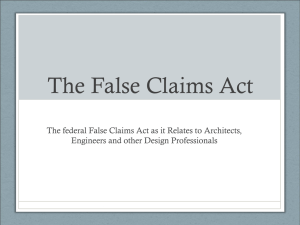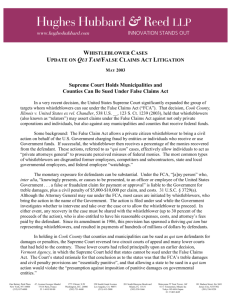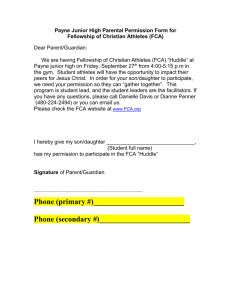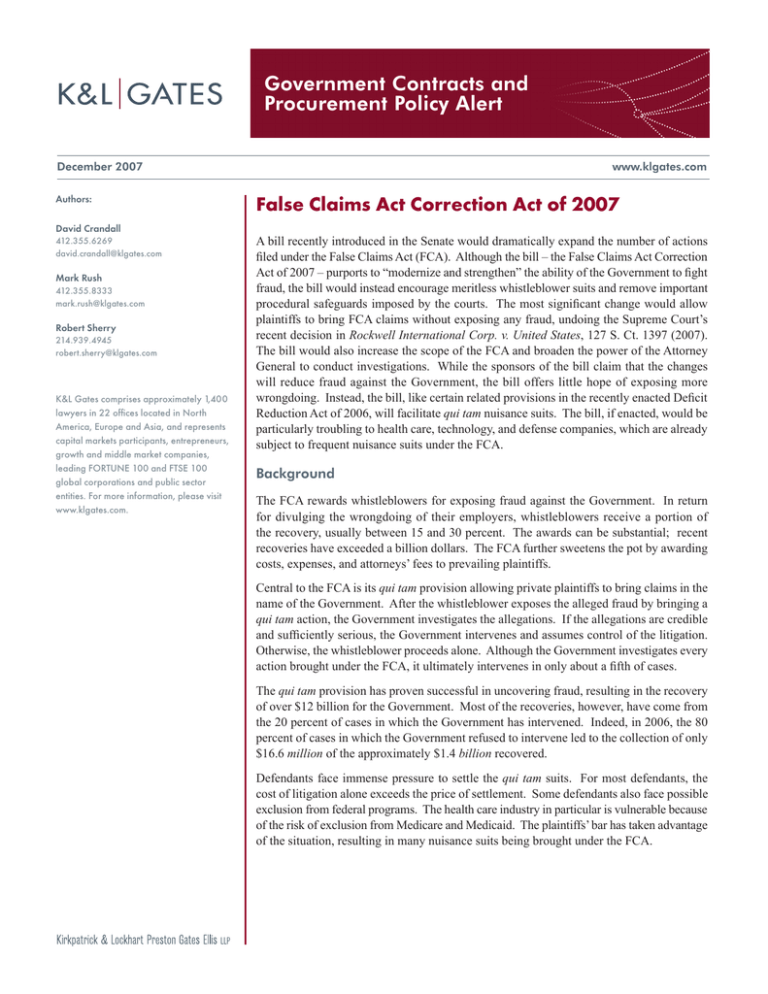
Government Contracts and
Procurement Policy Alert
December 2007
Authors:
David Crandall
412.355.6269 david.crandall@klgates.com
Mark Rush
412.355.8333 mark.rush@klgates.com
Robert Sherry
214.939.4945 robert.sherry@klgates.com
K&L Gates comprises approximately 1,400
lawyers in 22 offices located in North
America, Europe and Asia, and represents
capital markets participants, entrepreneurs,
growth and middle market companies,
leading FORTUNE 100 and FTSE 100
global corporations and public sector
entities. For more information, please visit
www.klgates.com.
www.klgates.com
False Claims Act Correction Act of 2007
A bill recently introduced in the Senate would dramatically expand the number of actions
filed under the False Claims Act (FCA). Although the bill – the False Claims Act Correction
Act of 2007 – purports to “modernize and strengthen” the ability of the Government to fight
fraud, the bill would instead encourage meritless whistleblower suits and remove important
procedural safeguards imposed by the courts. The most significant change would allow
plaintiffs to bring FCA claims without exposing any fraud, undoing the Supreme Court’s
recent decision in Rockwell International Corp. v. United States, 127 S. Ct. 1397 (2007).
The bill would also increase the scope of the FCA and broaden the power of the Attorney
General to conduct investigations. While the sponsors of the bill claim that the changes
will reduce fraud against the Government, the bill offers little hope of exposing more
wrongdoing. Instead, the bill, like certain related provisions in the recently enacted Deficit
Reduction Act of 2006, will facilitate qui tam nuisance suits. The bill, if enacted, would be
particularly troubling to health care, technology, and defense companies, which are already
subject to frequent nuisance suits under the FCA.
Background
The FCA rewards whistleblowers for exposing fraud against the Government. In return
for divulging the wrongdoing of their employers, whistleblowers receive a portion of
the recovery, usually between 15 and 30 percent. The awards can be substantial; recent
recoveries have exceeded a billion dollars. The FCA further sweetens the pot by awarding
costs, expenses, and attorneys’ fees to prevailing plaintiffs.
Central to the FCA is its qui tam provision allowing private plaintiffs to bring claims in the
name of the Government. After the whistleblower exposes the alleged fraud by bringing a
qui tam action, the Government investigates the allegations. If the allegations are credible
and sufficiently serious, the Government intervenes and assumes control of the litigation.
Otherwise, the whistleblower proceeds alone. Although the Government investigates every
action brought under the FCA, it ultimately intervenes in only about a fifth of cases.
The qui tam provision has proven successful in uncovering fraud, resulting in the recovery
of over $12 billion for the Government. Most of the recoveries, however, have come from
the 20 percent of cases in which the Government has intervened. Indeed, in 2006, the 80
percent of cases in which the Government refused to intervene led to the collection of only
$16.6 million of the approximately $1.4 billion recovered.
Defendants face immense pressure to settle the qui tam suits. For most defendants, the
cost of litigation alone exceeds the price of settlement. Some defendants also face possible
exclusion from federal programs. The health care industry in particular is vulnerable because
of the risk of exclusion from Medicare and Medicaid. The plaintiffs’ bar has taken advantage
of the situation, resulting in many nuisance suits being brought under the FCA.
Government Contracts and Procurement Policy Alert
The Bill
The False Claims Act Correction Act of 2007, if
enacted, would aggravate the misuse of qui tam actions.
The most important provisions of the bill are:
Weakening the Public Disclosure Bar. Perhaps
the most significant provision of the bill is the near
elimination of the “public disclosure bar,” an important
defense against qui tam actions brought under the
FCA. As the Supreme Court explained in Rockwell,
a plaintiff may not proceed with litigation based on
publicly available information unless the plaintiff was
the “original source” of that information. To be the
original source, the plaintiff must have “direct and
independent knowledge” of the allegations underlying
the qui tam claim. The public disclosure bar thus limits
rewards to those individuals actually exposing fraud.
The bill would limit the public disclosure bar in several
ways. First, the bill would define “public information”
narrowly. Only information “on the public record” or
“broadly disseminated to the general public” would
bar a claim. Information gathered from Government
employees or Freedom of Information Act requests
would not be considered public. Consequently, even
if the Government already knows about the alleged
fraud, or the information is available to any member
of the public upon request, the information would
not be “public.” Second, “all essential elements”
of the plaintiff’s claim would have to be publicly
available. Plaintiffs would be able to escape dismissal
by showing one non-public source of information,
such as a Freedom of Information Act request, rather
than the current standard of “direct and independent”
knowledge of the fraud. Third, only the Attorney
General would be able to invoke the public disclosure
bar. The defendant would have to convince the
Attorney General, rather than the court, to dismiss the
plaintiff’s claim. Whether the public disclosure bar
applies would be within the discretion of the Attorney
General.
The sponsors of the bill claim that the public disclosure
bar discourages whistleblowers, but it is unclear how
weakening the bar would expose more fraud. Rockwell
itself provides an example. In that case, the plaintiff
filed a qui tam action under the mistaken belief that his
former employer engaged in fraud. The Government,
in investigating the claim, found that the employer
engaged in an unrelated fraud after the plaintiff left
the employer. The Supreme Court denied recovery to
the plaintiff because he did not expose the fraud to the
Government; rather, the Government investigation did.
The sponsors of the bill have made clear, however, that
the plaintiff would have recovered had the revisions
been in effect, despite the absence of any discernable
benefit to the Government.
Permitting the Attorney General to Delegate
Investigations to Private Parties. Another important
provision of the bill would allow the Attorney General
to delegate the authority to issue civil investigative
demands (CIDs). Under the FCA, the Attorney
General may demand documents, answers to written
interrogatories, and oral testimony, even before a
lawsuit is filed. The FCA currently tempers this broad
power by limiting it to the Attorney General. Under
the revisions, however, the Attorney General would
be able to delegate the power to third parties. One of
the few checks on unlimited fishing expeditions – the
limited resources of the Attorney General – would thus
be removed. The bill would also allow any information
uncovered to be shared with qui tam plaintiffs, although
the third-party delegates and qui tam plaintiffs would
often be one and the same.
Abandoning the Presentment Requirement. The bill
would eliminate the “presentment requirement,” a
rule limiting FCA liability to those companies dealing
with the Government directly. Instead, liability
would extend to all companies directly or indirectly
seeking Government money or property. The bill
would overrule the D.C. Circuit’s decision in U.S.
ex rel. Totten v. Bombardier, 380 F.3d 488 (2004),
which refused to apply the FCA to claims presented
to Amtrak.
Redefining Government Property to Include ThirdParty Funds. The bill would expand the definition of
“Government property or money” to include third-party
money and property administered by the Government.
This change would specifically overrule U.S. ex rel.
DRC, Inc. v. Custer Battles, 444 F. Supp. 2d 678 (E.D.
Va. 2006), which refused to apply the FCA to Iraqi
funds administered by the United States.
Lengthening the Statute of Limitations. The bill would
lengthen the statute of limitations to ten years after the
fraud. Plaintiffs must currently bring actions within
six years of the fraud or within three years of the
Government learning of the fraud, whichever is later,
December 2007 | 2
Government Contracts and Procurement Policy Alert
but in any event no later than ten years after the fraud.
The bill would also allow the Government to come
within the limitations period by relating back to the
original filing date of a qui tam plaintiff.
Allowing Government Employees to Bring Qui Tam
Actions. One of the most controversial provisions
of the bill would allow Government employees to
bring qui tam actions. Although the bill would require
the employees to report the fraud to a supervisor and
the Attorney General and then wait twelve months
before filing an action, the proposed change raises
questions about how much Government employees
should personally profit from their work. The change
also creates the potential for strategic behavior by
Government employees.
Adding Offenses Giving Rise to FCA Liability. The
bill would expand FCA liability to additional offenses
not currently covered by the Act. Companies keeping
overpayments would be subject to liability, as would
companies converting funds to unauthorized uses.
Implications of the Bill
Expanding FCA Liability and the Number of
Nuisance Suits. Most of the changes proposed by
the bill would expand the reach of the FCA without
exposing additional fraud. The weakening of the
public disclosure bar, for example, would only reward
plaintiffs for filing mistaken claims or claims based on
information already known to the Government. No
new fraud would be exposed.
Even the proposed changes that may expose more
fraud, however, would expand the range of activities
subject to nuisance suits. The plaintiffs’ bar would
have a new range of targets, including companies only
indirectly receiving Government funds and companies
doing business with third-party funds administered by
the Government. While the goal of limiting fraud is
enviable, that goal comes at a high cost.
Removing the Protections of the Adversarial Process.
One of the most threatening consequences of the
bill would be the removal of procedural safeguards
meant to protect defendants from meritless suits.
Investigations previously restrained by the courts
and the limited resources of the Attorney General’s
Office would instead be in the hands of the plaintiffs’
bar. Companies would face costly fishing expeditions
without the benefit of court oversight. Further, one
of the most effective weapons against nuisance suits
– the public disclosure bar – would be removed from
the adversarial process and left to the discretion of the
Attorney General.
Conclusion
The False Claims Act Correction Act of 2007 would
dramatically expand the number of qui tam lawsuits,
without offering much hope of exposing more fraud.
Moreover, the bill removes important procedural
safeguards against meritless claims. Companies,
particularly in the health care, technology, and defense
industries, should be aware of the potential impact of
the bill. K&L Gates attorneys will be following its
development closely.
K&L Gates comprises multiple affiliated partnerships: a limited liability partnership with the full name Kirkpatrick & Lockhart Preston Gates Ellis LLP qualified
in Delaware and maintaining offices throughout the U.S., in Berlin, and in Beijing (Kirkpatrick & Lockhart Preston Gates Ellis LLP Beijing Representative
Office); a limited liability partnership (also named Kirkpatrick & Lockhart Preston Gates Ellis LLP) incorporated in England and maintaining our London
office; a Taiwan general partnership (Kirkpatrick & Lockhart Preston Gates Ellis) which practices from our Taipei office; and a Hong Kong general
partnership (Kirkpatrick & Lockhart Preston Gates Ellis, Solicitors) which practices from our Hong Kong office. K&L Gates maintains appropriate registrations
in the jurisdictions in which its offices are located. A list of the partners in each entity is available for inspection at any K&L Gates office.
This publication/newsletter is for informational purposes and does not contain or convey legal advice. The information herein should not be used or relied
upon in regard to any particular facts or circumstances without first consulting a lawyer.
Data Protection Act 1998—We may contact you from time to time with information on Kirkpatrick & Lockhart Preston Gates Ellis LLP seminars and with our
regular newsletters, which may be of interest to you. We will not provide your details to any third parties. Please e-mail london@klgates.com if you would
prefer not to receive this information.
©1996-2007 Kirkpatrick & Lockhart Preston Gates Ellis LLP. All Rights Reserved.
December 2007 | 3

